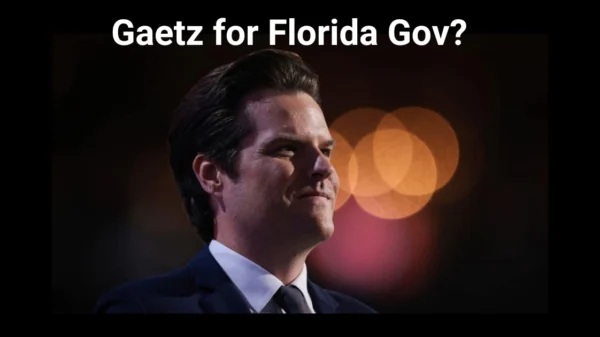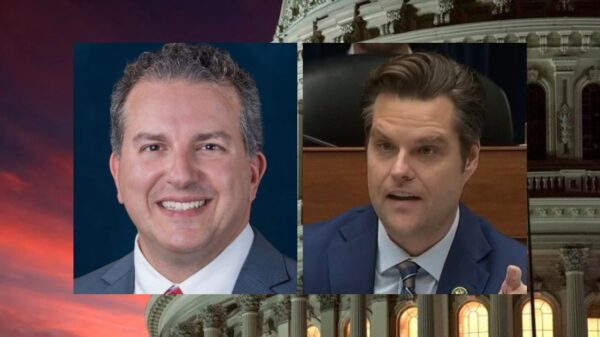U.S. Rep. Matt Gaetz, R-Fla., has joined with other members of Congress to call on the Environmental Protection Agency (EPA) to abandon its proposal to modify the New Source Performance Standards (NSPS).
Gaetz joined U.S. Sen. Susan Collins, R-Maine, U.S. Sen. Chris Murphy, D-Ct., and U.S. Rep. Scott Peters, D-Calif., to voice “strong opposition” to the EPA’s proposal to modify the NSPS, an Obama administration regulation to limit methane emissions from new, reconstructed, and modified sources in the oil and gas sector. Oil and natural gas operations are significant emitters of methane, a greenhouse gas whose effect on climate change is up to thirty-four times greater than that of carbon dioxide. In their letter, the members warned that this proposal would harm the environment by astronomically increasing the amount of methane emissions and urged the administration to rescind the proposed rule.
In July, Murphy and Collins introduced the bipartisan Super Pollutants Act of 2019, legislation in the U.S. Senate which aims to reduce emissions of short-lived climate pollutants (SLCPs)—pollutants that have a shorter atmospheric lifetime but warm the planet significantly faster than carbon dioxide. Peters and Gaetz introduced the companion legislation in the U.S. House of Representatives. Their legislation would codify the existing NSPS into law.
The text of the letter is below:
We write as cosponsors of the Super Pollutants Act in strong opposition to the proposed reconsideration amendments to the new source performance standards (NSPS), which cover methane emissions from new, reconstructed, and modified sources in the oil and gas sector.
Methane, which makes up about ten percent of U.S. greenhouse gas emissions, is 84 times more potent than carbon dioxide, when averaged over a 20-year time period, and is highly destructive to the climate because of how it absorbs heat. The oil and gas sector is the largest industrial source of methane emissions, releasing over eight million over metric tons of methane a year.
In 2012 and 2016, the Obama administration issued NSPS to cut methane emissions through leak detection and repair requirements that required oil and gas companies to check for leaks at least every six months and fix those leaks within 30 days. The NSPS were estimated to eliminate 175,000 tons of methane emissions, 150,000 tons of volatile organic compounds, and 1,860 tons of hazardous pollutants.
Alternatively, this proposed rule would rescind the methane requirements of the NSPS applicable to all oil and natural gas sources, estimated by the EPA to increase emissions by 370,000 short tons of methane from 2019 to 2025, equal to the emissions of 1.8 million additional passenger vehicles per year. While the EPA’s emission estimates alone are startling, the Environmental Defense Fund found that the oil and gas sector might emit 60 percent more than EPA’s estimates. As consumption of natural gas continues to grow, reducing methane emissions will become an increasingly important imperative.
The proposed rule states that the methane requirements are redundant with the existing NSPS for volatile organic compounds (VOCs) and, thus, “establish no additional health protections.” Yet, existing VOC controls cannot alone reduce methane emissions sufficiently to meet current climate goals, and this proposal will roll back the progress the industry is already making in detecting and fixing leaks.
Although oil and gas production increased six percent between 2016 and 2017, the industry also decreased methane emissions by eight million tons. And the industry continues to invest in emission-reducing technology to remain competitive with renewables. In 2014, ten oil and gas companies joined together to drastically reduce emissions, and in 2018, committed to reducing methane emission by one-third by 2025.
Having the NSPS in place assists the industry with meeting its targets. That’s why much of the oil and gas sector are supportive of such rules, including Shell, BP America, and ExxonMobil, which have asked the administration to maintain the 2016 NSPS.
In addition, we are skeptical that the proposed rule would lead to significant cost savings. The EPA claims that the proposed rule would save the oil and gas sector a mere $17 million to $19 million annually in compliance costs. By comparison, the 43 U.S. oil producers listed on the stock exchange earned a combined net income of $28 billion in 2018 alone.
Finally, we are concerned with the EPA’s analysis that would redefine the transmission and storage sector as outside the legal scope of the NSPS, which would create a concerning precedent for regulating other greenhouse gas emissions under Section 111 of the Clean Air Act. Blocking any future EPA obligation to regulate harmful greenhouse gas emissions would undermine the very mission of the EPA to protect human and environmental health.
Reducing methane emissions is the low-hanging fruit to slow climate change. The oil and gas sector is already investing, and eager to continue investing, in leak and repair technology to reduce emissions. That’s why we introduced the Super Pollutants Act. Among providing technical guidance for the containment of emissions in international initiatives and calling for standardized reduction emissions across the oil and gas sector, our bill would codify the 2016 NSPS to ensure that oil and gas industries continue to meet the existing performance standards.
We urge the administration to rescind the proposed rule and to work with Congress to pass our legislation that works with industry to curb methane emissions.
















